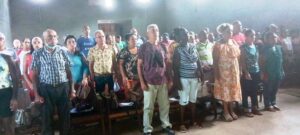A more perfected People’s Power.

The plans for the economy must include the proposals of the population, an aspect that is still weak and that will have to continue to be demanded, because the efficiency of the People’s Power depends in equal measure on the efficiency of the country.

What much can be achieved with the popular contest, what the people contribute if they are summoned and included in the decision making process, had in Matanzas its peak moment five decades ago with the decision to elect the laboratory of the complex political and social exercise that implied the creation of the Organs of the Popular Power.
The transcendental process that ended with the constitution of the provincial Assembly, precisely on July 21st, 1974, is remembered in Matanzas from the pride of having initiated the institutionalization of the State, a performance that deserved the praise of Fidel, who pondered the contributions of the people of Matanzas to extend the experience effectively to the national territory in 1976.
From its founding date until today, a continuous improvement governs the practice of the Government system in that vital need for the People’s Power to become more like this Cuba, in the unavoidable pretension also of the full compliance of its functions, as requested in the VI Party Congress.
These 50 years show how much remains to be gained in the relationship between delegates and leaderships of the assemblies, a strategic alliance so that the representatives of the constituencies exercise government in the communities, right there where the Cuban daily life takes place.
The possibility for men and women to transcend in their demarcation is often sadly influenced by the lack of arguments to conduct the essential accountabilities that continue to be wasted, inadequate processing of proposals or the failure to agree on mechanisms to solve local problems based on collective participation.
Although in Cuba there are examples of delegates and presidents of popular councils with well-earned prestige, on the other side of these communities there are many others whose work is hindered by the tendency of certain administrative cadres who disavow the mandate granted to them in the Electoral Law.
The president of the Cuban Parliament, Esteban Lazo Hernández, has insisted on the importance of the popular councils to enforce the stipulated attributions, which endow them with full powers to act as authentic local bodies.
In spite of such legitimacy, those recognized as basic cells of the system of the People’s Power have not yet succeeded in making their good performance the rule. Perhaps that is why, in some corner of Cuba, voices of discontent continue to be heard about the repeated failures in service provision units, situations that are detrimental to the normal development of life in the neighborhoods and which require the support of the entire population, led by their elected representatives.
To be fair, it should also be admitted that if anything in 50 years has called into question the figure of the delegate is the popular comment that nothing solves, that nothing material is granted, a concept that denies the intermediation that is assigned to them between voters and state entities, and their own work in the municipal assemblies, as representatives of those who voted for them.
If anything could raise the prestige of these social actors, it would be the accompaniment from the provincial assemblies so that the plans of the economy definitely include the proposals of the population, an aspect still weak and which will have to continue to be demanded, because at the end of the day, the efficiency of the Popular Power depends in equal measure on the efficiency of the country. The State needs it, and so do its people.
Written by Eva Luna Acosta Armiñán.




